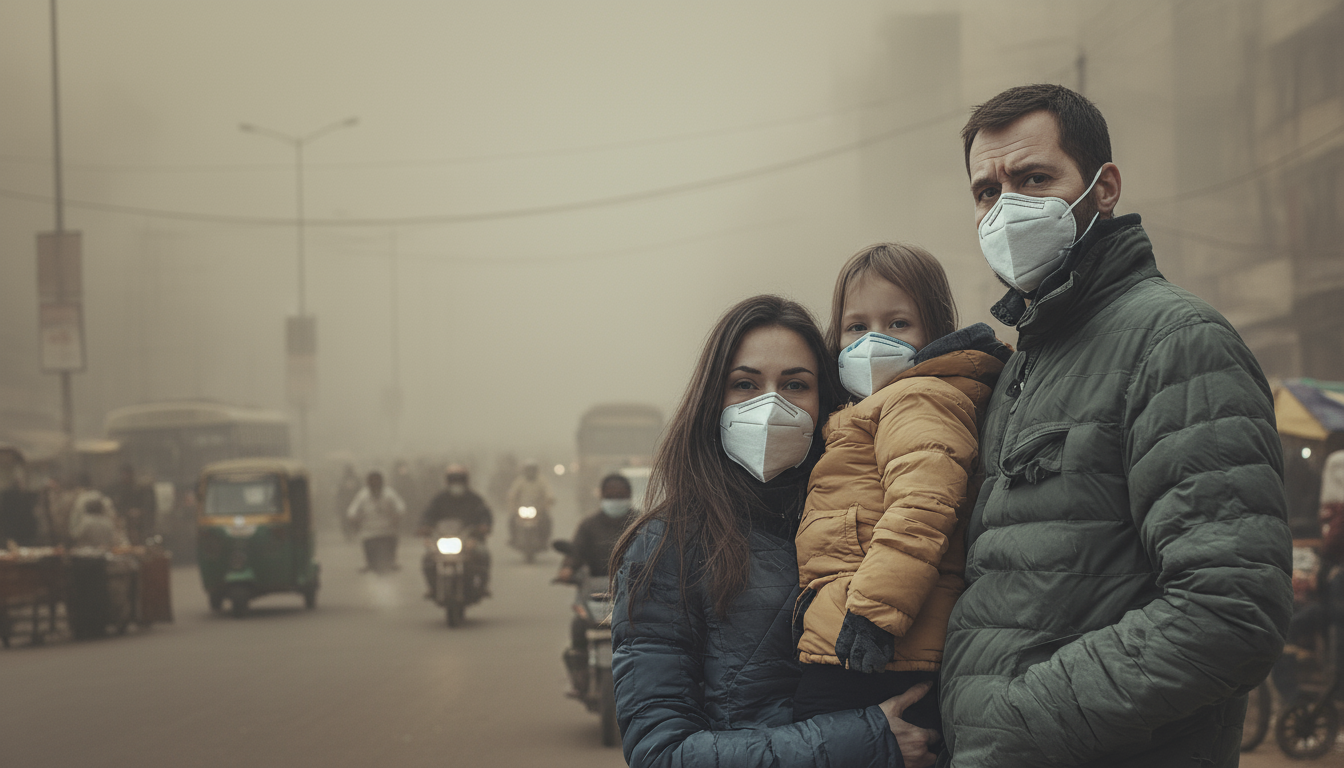Air Pollution Safety Guide 2025

With the end of the festive season, India welcomes the winter and with it comes the challenge of rising air pollution levels leading to smog. Cities like Delhi, Mumbai, Gurugram, Hyderabad, Bengaluru etc often face hazardous AQI levels.
In such conditions, it’s essential to be aware of the health risks and take the right precautions to keep yourself and your loved ones safe.
⚠️ Health Hazards of Air Pollution
Prolonged exposure to polluted air can cause both short-term discomfort and long-term health issues.
🌬️ Respiratory Issues:
Air pollution irritates the airways, leading to coughing, wheezing, and breathlessness.
It worsens asthma and bronchitis symptoms.
🫁 Chronic Lung Diseases:
Continuous exposure to pollutants may lead to COPD (Chronic Obstructive Pulmonary Disease) and even lung cancer.
❤️ Heart Diseases:
Pollutants can enter the bloodstream, increasing risks of heart attacks and strokes, especially during smog season.
🧬 Weakened Immunity:
Long-term exposure reduces your body’s natural defense system, making you prone to infections.
🤧 Allergies:
Dust, pollen, and suspended particles may trigger allergic reactions and sinusitis.
👁️ Eye Irritation:
Itchy, burning, or red eyes are common.
In severe cases, prolonged exposure may lead to eye infections.
🏙️ Outdoor Precautions
When the air quality dips, taking preventive outdoor measures can protect your lungs and heart.
📲 Check Air Quality Regularly
Use real-time AQI apps.
Avoid stepping outdoors when AQI exceeds 300 (Severe category).
😷 Wear an N95 or N99 Mask
Choose certified masks that filter PM2.5 and PM10 particles.
Avoid surgical or cloth masks as they’re less effective.
Dispose of masks safely after use.
🚶♂️Limit Outdoor Activities
Avoid running or jogging outdoors when pollution is high.
Opt for indoor workouts, yoga, or stretching instead.
🚗 Cleaner Transportation Choices
Use public transport, carpooling, or electric vehicles.
Regularly maintain your vehicle to reduce emissions.
🌳Avoid Burning Waste
Never burn dry leaves, plastics, or garbage — they release toxic fumes and worsen local air quality.
🏠 Indoor Precautions
Indoor air quality matters as much as outdoor air, especially during smog season.
🌀 Use Air Purifiers
Install a purifier with a HEPA filter to remove fine particles.
Keep filters clean and replace them as per instructions.
🪴 Add Air-Purifying Plants
Plants like Snake Plant, Spider Plant, Aloe Vera, Peace Lily, and Areca Palm help cleanse indoor air naturally.
🚪 Ensure Proper Ventilation
Avoid opening windows early morning or late evening when smog settles.
Use exhaust fans and chimney filters to improve circulation.
🥗 Stay Hydrated & Eat Right
Drink plenty of water and herbal teas to flush toxins.
Include Vitamin C (oranges, amla), Omega-3s (flaxseed, walnuts), and Vitamin E (almonds, sunflower seeds) in your diet.
Avoid fried and oily food during smog season.
🧼 Keep Indoors Dust-Free
Regularly clean floors, curtains, and furniture using damp cloths.
Use vacuum cleaners with HEPA filters for better dust removal.
🩺 Medical Precautions
If you or your family members face breathing difficulties or prolonged irritation, take prompt medical action.
👨⚕️ Consult a Doctor
Seek medical advice for continuous coughing, wheezing, or chest tightness.
People with asthma or heart conditions should keep medicines handy.
💨 Steam Inhalation & Nasal Irrigation
Regular steam inhalation (with eucalyptus or peppermint oil) helps clear airways.
Use saline sprays or nasal irrigation to flush out pollutants.
👁️ Protect Your Eyes
Wear UV-protective glasses outdoors.
Use lubricating eye drops to prevent dryness and irritation.
💉 Get Vaccinated
Flu and pneumonia vaccines can offer protection against respiratory infections during pollution-heavy months.
🌿 Latest Smart Habits 2025
📱 Smart Air Monitors:
Install portable smart air quality monitors at home to get alerts when indoor air quality drops.
🤖 Smart Home Integration:
Connect your purifier to smart home systems (Alexa/Google Home) for real-time air control.
🧘 Mindful Breathing & Yoga:
Practice Pranayama, Anulom-Vilom, and deep breathing to strengthen lung capacity naturally.
🧾 Conclusion
Air pollution poses a serious health risk every winter, especially across metropolitan cities of India. Prolonged exposure can damage your lungs, heart, and immunity.
Adopt simple indoor and outdoor precautions, stay hydrated, and follow healthy habits to safeguard your well-being.
As you prepare for the smog season, consider a comprehensive health insurance plan that covers pollution-related illnesses and offers wellness benefits to help you stay healthy year-round.
⚖️ Disclaimer
The information in this blog is for general purposes only. It is not intended to substitute professional medical advice, diagnosis, or treatment. Kindly seek the advice of your healthcare provider with any concerns you may have regarding your health and read the policy document to understand the insurance policies and wellness benefits.

